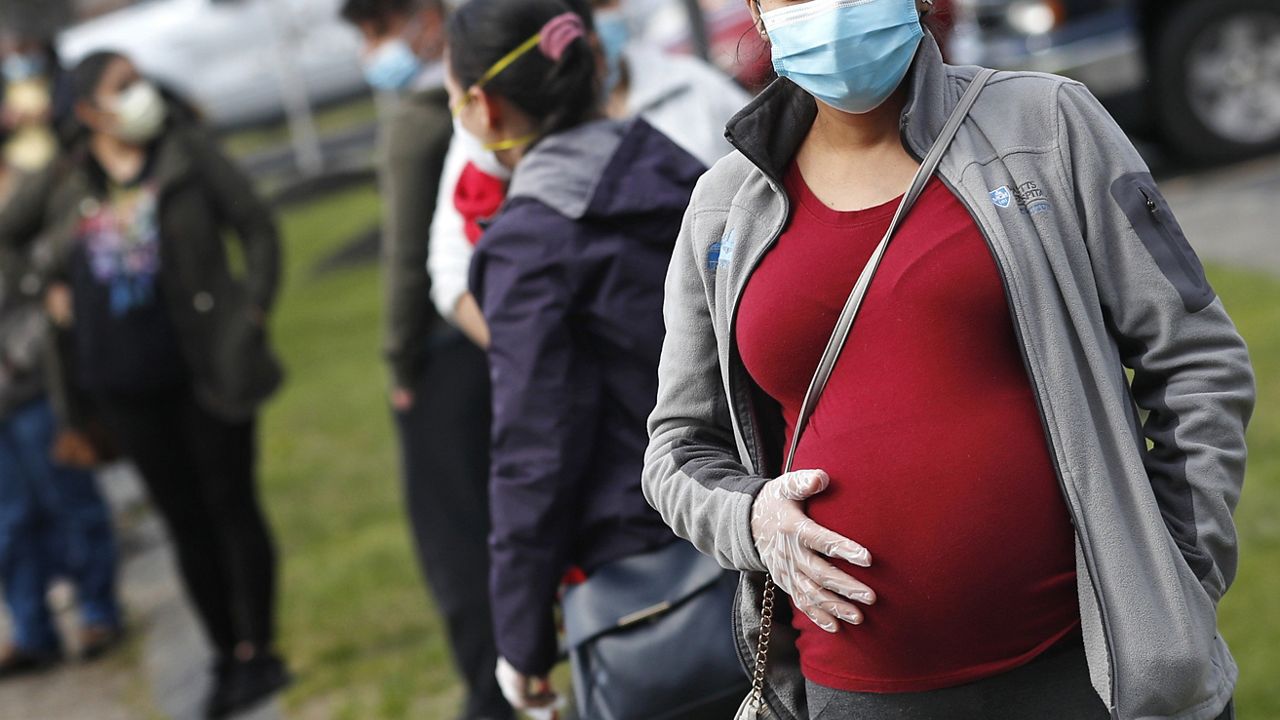Pregnancy has its risks. Pregnancy with COVID-19 is even riskier.
But experts say it is still possible to have a safe and healthy pregnancy during the pandemic.
Initially it seemed that the novel coronavirus had little to no impact on expectant mothers, but with over 25 million COVID-19 cases nationwide, researchers have a clearer picture of how pregnant women might fare with the virus.
A study published this month in JAMA (The Journal of the American Medical Association) Internal Medicine found that of more than 406,000 women hospitalized for childbirth, the absolute rates of death and severe illness are low among pregnant women with COVID-19.
But the risk of in-hospital deaths, blood clotting, preterm births and preeclampsia was significantly higher among pregnant women who had coronavirus.
"We know that our pregnant women are about twice as likely to end up in the intensive care unit. They're more likely to end up on a ventilator as well," Dr. Rachel Humphrey, director of Maternal Fetal Medicine for AdventHealth Systems, told Spectrum News.
While that may sound scary, Humphrey says the takeaway should be that the vast majority of pregnant women infected with COVID-19 get through it with little to no lasting impacts.
"I do think what is helpful is telling women that it’s likely if they get COVID, they'll be OK, but that they do need to take steps to decrease their chance for infection," she said.
Basically, follow the recommendation of health experts: limit exposures to people outside your household, wear a mask, and wash your hands frequently.
It is hard though, when planning to get pregnant, or if you're already pregnant, to ignore the data and assume you won’t be the exception.
Dr. Mary Jane Minkin, an OBGYN at the Yale School of Medicine, says the women that need to be extra vigilant, are those already living with health conditions like diabetes and obesity. Because she says, growing a baby leaves little room for the body to protect against existing health problems and a nasty virus.
"Circulating fluid volume goes up 50 percent during pregnancy. So the heart's working 50% harder. And so in a woman who's fine and healthy, she can handle that extra volume and the extra pumping activity," said Minkin. "But if she has some sort of compromise otherwise that she gets sick on top of this, this is a problem because your heart's going to work even that much more."
Not to mention, Minkin says, the fetus presses up against the diaphragm as it grows, making the mechanics of breathing quite difficult. “You have compromised the lung volume, which is somewhat restricted,” said Minkin.
Experts recommend pregnant women, particularly those with pre-existing health conditions, be vaccinated against COVID-19, even with limited data on its safety and benefits to that population. While the Pfizer-BioNTech and Moderna COVID-19 vaccine trials did not focus on pregnant women, some participants did get pregnant and there were no reported negative impacts.
Humphrey says more research is needed, but tells her patients that the Pfizer and Moderna vaccines are much like others recommended routinely during pregnancy, in that they do not contain a live virus.
"Live vaccines like the varicella vaccine, for example, or the MMR – the measles, mumps and rubella vaccine – those actually have live viruses in them. And those viruses actually have the ability to cause birth defects. So we avoid those,” said Humphrey. "The Moderna and the Pfizer vaccines do not have any live virus in them. They just have a little bit of messenger RNA, which is like a recipe. And when those vaccines get injected, they don't go through your bloodstream. They do not get to your baby. They go to the cells at the site of the injection."
Humphrey says the body then gets rid of the mRNA relatively quickly.
Ultimately these doctors say whether to get pregnant in the midst of a pandemic or vaccinated against COVID-19 during pregnancy is a conversation between the patient and her physician. A woman’s daily exposure risk, current health, age and access to the vaccine should all play into the decision making.
"For a patient who, let's say, has a lot of exposure – maybe she is a cashier, maybe she's a respiratory therapist in an emergency department – those patients are much more likely to get the infection," Humphrey said. "So it makes sense to get the vaccination."
"I also have a large number of patients who have medical problems. Maybe they're immunocompromised because of a kidney transplant,” Hymphrey added. "These are problems that we know are associated with a worse case of COVID-19. Those patients also would benefit from vaccination to help prevent them from either getting the infection or the vaccines have been shown to decrease the severity of infection as well."
Or, Minkin says, if possible, wait until you can get vaccinated, and then work on growing that family: "If somebody who's 30 years old [thinks], oh, this would be a good time for me to have a kid. Well, maybe it's not such a bad idea to wait."



